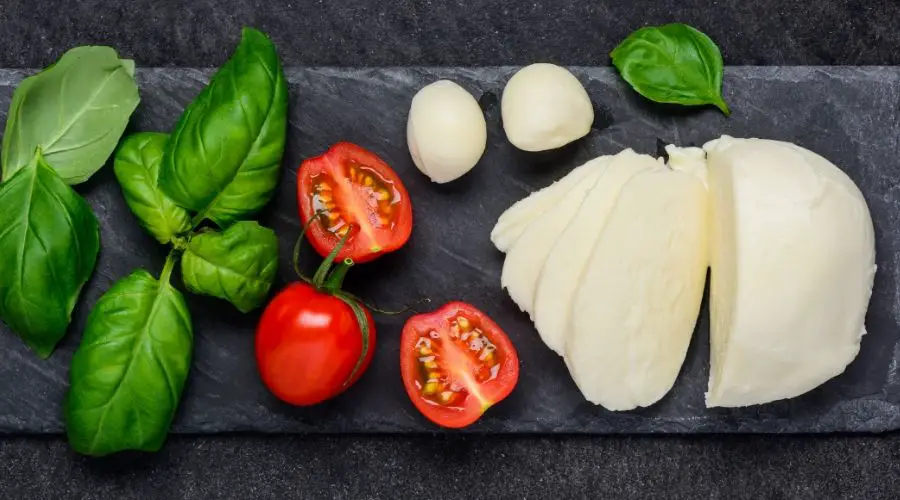Who doesn’t love mozzarella? I wish every dish could come au gratin, topped with heaps of ooey-gooey, melted mozzarella cheese!

Fortunately for cheese lovers like me, most types of cheese (including mozzarella) are very low in carbs with a good amount of fat. For this reason, mozzarella is one of the best types of cheese to eat on a Ketogenic diet. It also makes a great choice for those following other low carb diets, like Paleo or Atkins.
I love adding mozzarella to low carb casseroles and to cauliflower pizza crust. This cheese is truly a low carb staple, adding great flavor and protein to your dishes.
But you don’t want to get too cheesy… You’ll want to consume mozzarella in moderation because it is also high in calories and saturated fat.
How Many Carbs are in Mozzarella Cheese?
- A whole cup a shredded mozzarella contains only 3.5 grams of carbs.
- There are 0.4 grams of carbs in a small mozzarella ball (about 1 inch – roughly the size of a cherry).
- There are 8 grams of carbs in 1 breaded mozzarella stick.
How Many Calories are in Mozzarella?
- There are 50 calories in a cubic inch of Mozzarella cheese.
- A full cup of shredded mozzarella contains 316 calories.
- Breaded and deep-fried mozzarella sticks contain 102 calories per piece.
Origin
Mozzarella cheese is a curd cheese that originated in Italy. Although today most of the Mozzarella available now comes from cow’s milk, traditionally, this cheese was made from milk of water buffalos herded all over Italy and Bulgaria.
Mozzarella cheese is usually white in color, but some varieties have a tinge of light yellow. Most types of mozzarella are used to make pizza and several pasta dishes, like lasagne. Caprese salad is also popular dish, which consists of mozzarella balls or slices with chopped or cherry tomatoes and fresh basil.
Mozzarella has a high moisture content. It can be served the very next day after it is made or it can be stored for 7 days or longer when vacuum-sealed and packed with brine. Low-moisture mozzarella can be stored in the refrigerator for up to 30 days. The shelf life of shredded mozzarella is longer. You can also freeze mozzarella to extend its expiration date.
Nutrition Facts
| Based on a 1-ounce slice (28 grams) of Mozzarella cheese. | |
| Calories 78 | |
| % Daily Value* | |
| Total Fat 4.8 grams | 7% |
| Saturated fat 3 grams | 15% |
| Polyunsaturated fat 0.1 grams | |
| Monounsaturated fat 1.4 grams | |
| Cholesterol 15.1 milligrams | 5% |
| Sodium 4.5 milligrams | 0% |
| Potassium 26.6 milligrams | 0% |
| Total Carbohydrate 0.9 grams | 0% |
| Dietary fiber 0 grams | 0% |
| Sugar 0.3 grams | |
| Protein 8 grams | 16% |
| Vitamin A | 2% | Vitamin C | 0% |
| Calcium | 20% | Iron | 0% |
| Vitamin D | 0% | Vitamin B-6 | 0% |
| Cobalamin | 5% | Magnesium | 1% |
Effects/Side Effects
The bad news is mozzarella contains saturated fat which can be a concern for cardiovascular health and weight issues. Since most of the fat in mozzarella cheese is saturated, this means it contains dietary cholesterol. For this reason, it is best to enjoy this cheese in moderation.
It is also a good idea to purchase cheeses that are partly skimmed, like low-fat mozzarella sticks which contain only 80 calories each, 7 grams of protein and 222 mg of calcium. They come individually wrapped, too, so you can grab them on-the-go and easily control your portion size.
Health Benefits
Rich in Vitamin A, Vitamin E and Vitamin D
Mozzarella cheese also contains vitamin A, E, and D. These are important fat-soluble vitamins required for calcium absorption, healthy bones and protection of your body’s cells.
Biotin for Strong Hair and Nails

Mozzarella cheese is rich in Biotin, also known as vitamin B7. The body doesn’t store this vitamin because it is water soluble and excreted in the urine. Eating this mozzarella can satisfy your body’s immediate B7 needs. This vitamin also stops nails from turning brittle and prevents hair fall. Studies have shown biotin may also have the power to reduce blood glucose levels in people with diabetes. Pregnant women often become deficient in Biotin. Consuming cheese can help restore B7 levels in individuals who are deficient in this vital nutrient.
Calcium for Strong Bones
Mozzarella is high in calcium, an important mineral required by the body for healthy bones and tooth enamel. Just 1 ounce of mozzarella cheese contains over 180 milligrams of calcium. Calcium plays a vital role in protecting heart muscles and it reduces the risk of some cancers. Studies show that calcium may also promote weight-loss.
An Excellent Source of Protein
Mozzarella is high in protein, the building block of healthy muscle tissue. Protein also helps keep you feeling full for longer. Consuming mozzarella also boosts energy and muscle strength.
Source of Potassium
Potassium is another important mineral contained in mozzarella cheese. Potassium helps lowering blood pressure and can stabilize abysmal heart rhythms. Eating a diet that fulfils your potassium needs may help reduce blood pressure and water retention. Potassium can also prevent osteoporosis, kidney stones and stroke.
A Good Source of Riboflavin
Mozzarella is rich in Vitamin B2, also known as riboflavin. Riboflavin is needed by the body for cell growth and health. It also has proven antioxidant properties. Vitamin B2 helps the body break down carbohydrates, proteins and fats for energy, and it allows oxygen to be used by the body to burn food for fuel. Consuming foods high in riboflavin helps the body fight various ailments, like migraines and anemia.
Niacin for Healthy Cholesterol Levels
Mozzarella also contains vitamin B3, also known as Niacin, which plays a vital role in the body’s metabolic process of burning fat for energy. Niacin helps control cholesterol levels and prevents the onset of diabetes and arthritis. Every part of your body needs Niacin to function properly. As a supplement, niacin may help lower cholesterol, ease arthritis and boost brain function, among other benefits. Just don’t take too much, as excess Niacin can have negative effects.
Phosphorus for Healthy Digestion and Kidney Function
The phosphorus contained in mozzarella assists the body in calcium absorption. It is also needed for healthy digestive function and proper kidney filtration. The mineral can also help fight fatigue and brain fog.
Zinc to Increase Healthy White Blood Cells
Zinc is another important mineral contained in Mozzarella cheese. Zinc helps increase white blood cell count in the body and facilitates healthy functioning of the prostate. Studies show that zinc may also promote weight-loss.

Sugar in Mozzarella
Mozzarella cheese is very low in sugar with only 0.3 grams in a 1-ounce slice (28 grams).
Protein in Mozzarella
Mozzarella is an excellent source of protein with 8 grams in a small 1-ounce slice.
Low Carb Mozzarella Stuffed Meatballs Recipe
Ingredients:
- 2 pounds of lean ground beef. (You can use ground turkey or chicken if you prefer.)1 small onion, diced
- 2 cloves garlic, pressed
- 1/3 of a red or green bell pepper, diced
- 100 grams of mozzarella, balled
- ½ teaspoon oregano, dried or fresh and chopped
- ½ teaspoon dried or fresh basil, chopped
- ½ teaspoon sea salt
- ½ teaspoon black pepper
- ¼ cup of fresh parsley, finely chopped
- 1 egg
- 2 tablespoons olive oil
- ½ cup reduced-sugar marinara sauce or tomato sauce
- ¼ cup water
Instructions:
- In a large mixing bowl, combine meat with all ingredients except mozzarella balls, oil, marinara/tomato sauce and water, mixing ingredients well until combined.
- Cover each ball of mozzarella with meat, forming a large meatball. (These may look overly large at this point, but they will shrink down quite a bit when cooking.
- In a large skillet, heat up olive oil and add meatballs slowly and braise them at high heat until they get dark brown color on the outside (to give them extra flavor). You may need to braise them in batches so you don’t overcrowd the pan. Don’t worry if they’re not cooked all the way through at this point, they will go into the oven later.
- Once the balls are braised, add them to a large 2 inch deep baking pan or casserole dish.
- Add water to marinara or tomato sauce and stir well to thin out sauce (this stretches your sauce farther so you can use less). Pour marinara sauce over the balls, cover with aluminum foil and bake in a 350 degree oven for about 30 minutes until bubbly and meatballs are fully cooked.
- Top with additional shredded cheese and place back into the oven for another 5 minutes.
- Garnish with an extra sprinkle of parsley and serve over zucchini noodles, spaghetti squash or own their own alongside Caprese or Cesar salad.
This recipe serves a family of 4.
